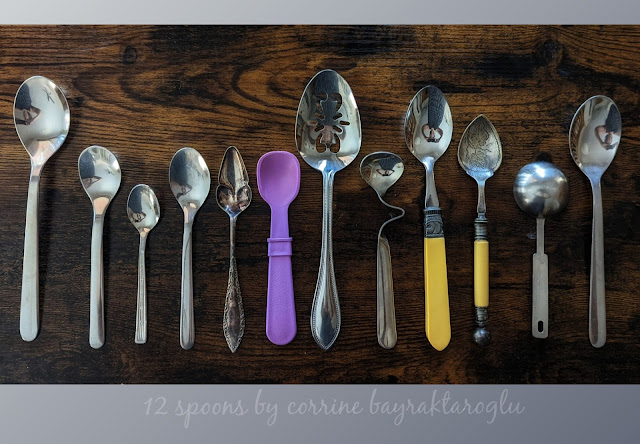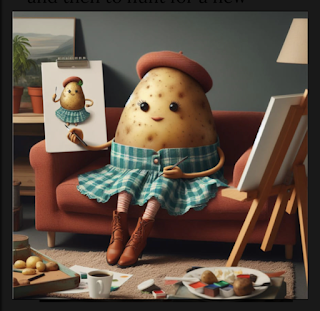Parkinson's: Knowing Your Limits
A Balancing Act
On Thursday, I was still dog tired. But I was doing something I really wanted to do.
I was making new tags for the
Permanent Collection and writing a new show description for the JBC Gallery.
I had also promised Valerie,
the new YSAC Gallery Coordinator, that I would gallery host at the gallery that
day. It was a Thursday, I knew it would be slow, so I asked Kathy if she could
come and join me there. (She also loves
the collection and has done so much for it.)We had a great time talking about
the Permanent Collection and what it needed. I found myself wondering, if I
could still be in charge of the
collection. I texted Kathy about it and
asked, “Do you think I could still do
it?”
But that day, like the ones before, I used up too many spoons. My off times, started earlier and my symptoms were stronger.
Friday, I was still tired and working on the tags. It was pouring rain out and I was doing my regular stuff, doing some grocery shopping, making dinner, and attending my boxing class. I found myself a little cranky.
• In the morning, I had texted Corrine and asked, “I'm
thinking, maybe, I should keep being in charge of the collection until we can
put it on a better foot and find someone else to be it's champion.
• At the end of the day, I wrote another text to
Corrine, it said “My medicine has run out and I am so Parkifried. (Even then, I stopped for a moment to be very
proud of making up that word!) I am toddling around, and it was hard for me to
get down on the floor to clean up a cat vomit! I almost fell trying to stand
back up. Corrine, who am I kidding? Tonight, I am too tired and whiny to
think. Good night my friend. I think
Snarky just bit me in the butt.”
That night I couldn't sleep
until 11:30 and was back up at 3am.
I had used up too many spoons.
So this is what I am trying to
figure out, how much is too much and when do I have to say to myself no, I
can't do it?
At the end of 2020, I retired from my beloved Gallery Coordinating job.
As part of that job, I was
responsible for the Yellow Springs Arts Council's Permanent Collection
(PC). The PC had grown to be over 200 pieces of art, donated
by 150 local artists. It was alive and
still growing. I led a wonderful group
of volunteers who helped keep it safe and watched over it as it grew. We regularly planned events and hung gallery
shows, that we drew from the collection.
Then I retired and COVID hit with a Boom. The community space, the gallery was in, became off limits for visitors. The PC show that had been up- stayed up- for another 2 years.
I love the collection and feel
responsible to the artists who have pieces in it. The new interim gallery
coordinator was enthusiastic and willing and wonderful, but she had never even
seen the collection. She emailed all the old volunteers on the PC Committee.
Only 3 people answered- me, Kathy and Julia. After COVID, for one good reason
or another almost all of the PC Committee was gone or not able to help anymore.
That's when I started going through Kathy's master list of artists in the collection
and writing emails.
On Wednesday, it was finally
moving forward again.
Do you remember the Spoon Theory? Christine Miserandino created it. It is a great way of explaining to your friends or family, what it is like to live with a chronic disease-mental or physical. I wrote about it, before in an August post last year.
I think it is worth a second
time around.
Christine Miserandino has Lupus. One night, in a restaurant, she created the Spoon Theory to answer a friend's question. This friend, who had been with her at the Doctors and had seen her in her worst moments had just asked Christine what it felt like to have Lupus, to be sick. Christine was gobsmacked, (couldn't resist, love that word!) this was a very close friend, one she thought would know.
So this is what she did:
She grabbed a bunch of spoons off of their
table and the table next to them.
She thrust them into her friend's
hands.
She said “You have lupus. Count
the spoons.”
Her friend counted them.
“Twelve, there are twelve spoons.”
Then she joked around and said she'd like more.
Christine said “No, you can't have more.”
“That is how much energy you have to spend
on your day.”
Then she asked her to list what she does in her
day-starting with opening her eyes and getting out of bed. (With
Parkinson's I am usually awake for hours before I open my
eyes. I turn over with difficulty, to get one leg over the bed
and then the other leg I brace on the side of the bed and hold onto it with one
hand, to lever myself up. I fumble, as quietly as I can, on my side table for
my glasses. In the dark, I slowly shuffle over to the alarm
clock to see what time it is. At 7, I get to take my pills. An hour
after that, I will be “on” and can eat.)
Christine took away a spoon for each detail. For taking her
medicine she needed to eat first. She took one spoon from her friend. (For me I
can't have eaten for 2 hours before taking my medicine and then for one hour
after taking it. That is if I believe the Parkinson's Specialist from the Mayo
Clinic. My Nurse Practitioner cuts that time in half.)
Christine explained that the
difference between being sick and being healthy is having to make careful
choices of what you can do or can not do. You have 12 spoons full of energy.
Before her friend was even at work for the morning, half
her spoons were gone.
When your “spoons” are gone, they are gone. On a good
day, you can borrow against tomorrow’s “spoons.” But tomorrow you may crash,
because you start the day with less spoons.
Mostly you need to learn
to slow down and not do everything.
I believe that you can do what you set your mind to. But I need to remember to balance that
against the reality of how many spoons I have to work with today.
May your days be filled
with good adventures,
that stop short of using
up all of your spoons.
Cheers,
Nancy & the Snark
*******************************************************
Footnotes From Corrine: Yep! I do think your parky was frying your butt, and I love your word Parkifried. There are some pluses in that it's lovely to see you full of enthusiasm and joy for supporting the local art collection. It's taken a while to find your equilibrium and not be focused on Parky damage control. The minus is finding out there are limits to just how much. The question is how many spoons are you willing to put on your plate for each activity or project per day.
Love Your Bestie from Afar


This is so true for every human being no matter healthy, unhealthy, aged, young, even nonhuman beings, trees, plants, sun, ocean, space, life in general, there are only so many spoons, no more and it is wonderful to be alive however life is,
ReplyDeleteJulia
You are right Julia, it is wonderful to be alive however life is.
DeleteI love that spoon face. Perfect for what Nancy described in today’s post.
ReplyDelete